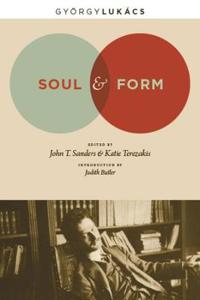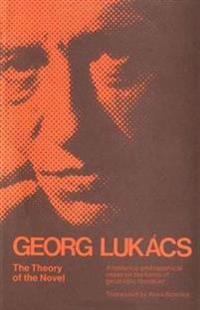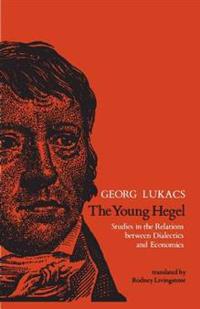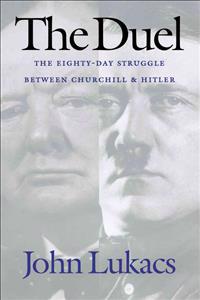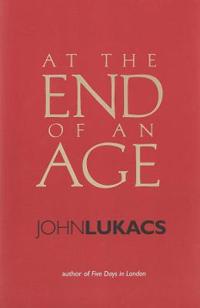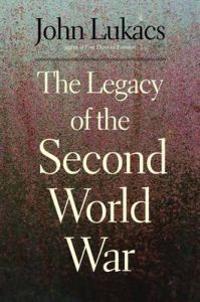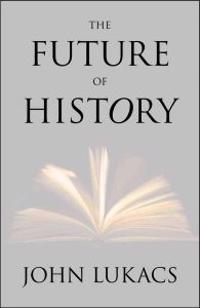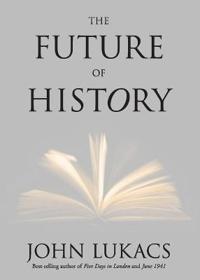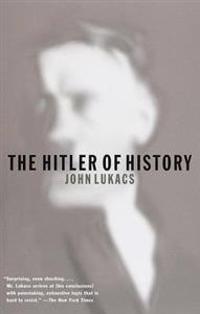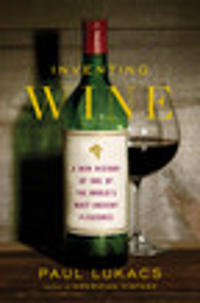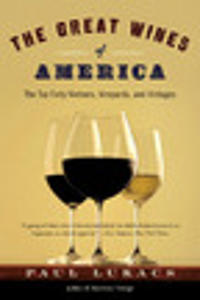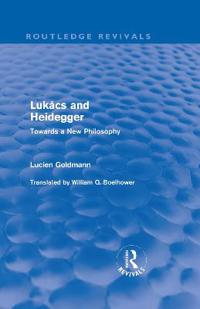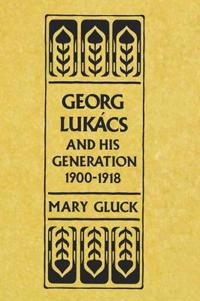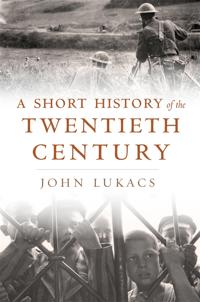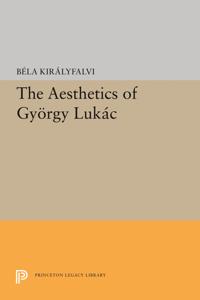Polaroids (Inbunden)
avAttila Richard (PHT) Lukacs, Michael (ART) Morris, Attila Richard (PHT) Lukacs
ISBN: 9781551522951 - UTGIVEN: 2010-11Master and the Slave, The: Lukacs, Bakhtin and the Ideas of Their Time (Inbunden)
avGalin Tihanov
ISBN: 9780198187257 - UTGIVEN: 2000-05-18Soul and Form (Övrig)
avGeorg Lukacs
ISBN: 9780231149808 - UTGIVEN: 2009-12-15Gyorgy Lukacs was a Hungarian Marxist philosopher, writer, and literary critic who shaped mainstream European Communist thought. Soul and Form was his first book, published in 1910, and it established his reputation, treating questions of linguistic expressivity and literary style in the works of P[...]
Soul and Form (Häftad)
avGeorg Lukacs
ISBN: 9780231149815 - UTGIVEN: 2009-09Gyorgy Lukacs was a Hungarian Marxist philosopher, writer, and literary critic who shaped mainstream European Communist thought. Soul and Form was his first book, published in 1910, and it established his reputation, treating questions of linguistic expressivity and literary style in the works of P[...]
Theory of the Novel (Pocket)
avGeorg Lukacs
ISBN: 9780262620277 - UTGIVEN: 1974-01Georg Lukacs wrote The Theory of the Novel in 1914-1915, a period that also saw the conception of Rosa Luxemburg's Spartacus Letters, Lenin's Imperialism: The Highest Stage of Capitalism, Spengler's Decline of the West, and Ernst Bloch's Spirit of Utopia. Like many of Lukacs's early essays, it is a [...]
Five Days in London, May 1940 (Pocket)
avJohn Lukacs
ISBN: 9780300084665 - UTGIVEN: 2001-08-11The days from May 24 to May 28, 1940, altered the course of the history of this century as the members of the British War Cabinet debated whether to negotiate with Hitler or to continue the war. The decisive importance of these five days of Lukacs's magisterial new book. illustrations.[...]
The Duel: The Eighty-Day Struggle Between Churchill and Hitler (Häftad)
avJohn Lukacs
ISBN: 9780300089165 - UTGIVEN: 200103This is a day-by-day account of the eighty-day struggle in 1940 between Hitler—poised on the edge of absolute victory—and Churchill—threatened by imminent invasion and defeat.[...]
At the End of an Age (Häftad)
avJohn R. Lukacs
ISBN: 9780300101614 - UTGIVEN: 2003-09This compelling book is a deeply informed reflection on the nature of historical and scientific knowledge. Renowned historian Juhn Lukacs asserts that now, even at the end of the modern age, our understanding of the universe is based on what we fallible human beings have imagined and defined in a hi[...]
The Legacy of the Second World War (Inbunden)
avJohn Lukacs
ISBN: 9780300114393 - UTGIVEN: 201002Sixty-five years after the conclusion of World War II, its consequences are still with us. In this probing book, the acclaimed historian John Lukacs raises perplexing questions about World War II that have yet to be explored. In a work that brilliantly argues for World War II's central place in the [...]
Democracy and Populism (Inbunden)
avJohn Lukacs
ISBN: 9780300116939 - UTGIVEN: 2006-11This intensely interesting - and troubling - book is the product of a lifetime of reflection and study of democracy. In it, John Lukacs addresses the question of how democracy has changed, and why we have become vulnerable to the shallowest possible demagoguery. Lukacs contrasts the political system[...]
The Siege of Budapest: One Hundred Days in World War II (Häftad)
avKrisztian Ungvary, John Lukacs
ISBN: 9780300119855 - UTGIVEN: 200609The Future of History (Inbunden)
avJohn Lukacs
ISBN: 9780300169560 - UTGIVEN: 201104For more than sixty years, John Lukacs has been writing, teaching, and reading about the past. In this inspired volume, he turns his attention to the future. Throughout "The Future of History", Lukacs reflects on his discipline, eloquently arguing that the writing and teaching of history are literar[...]
The Future of History (Pocket)
avJohn Lukacs
ISBN: 9780300181692 - UTGIVEN: 201205For more than sixty years, John Lukacs has been writing, teaching, and reading about the past. In this inspired volume, he turns his attention to the future. Throughout "The Future of History", Lukacs reflects on his discipline, eloquently arguing that the writing and teaching of history are literar[...]
The Hitler of History (Häftad)
avJohn Lukacs
ISBN: 9780375701139 - UTGIVEN: 199811"A valuable service . . . serious, entertaining, provocative and distinctive." --Cleveland Plain Dealer
In the fifty years since his suicide amid the ruins of Berlin, Adolf Hitler has been the subject of more biographies than any comparable figure of our time--and at the center of a cruc[...]Inventing Wine (Inbunden)
avPaul Lukacs
ISBN: 9780393064520 - UTGIVEN: 2012-12Drinking wine can be traced back 8,000 years, yet the wines we drink today are radically different from those made in earlier eras. While its basic chemistry remains largely the same, wine's social roles have changed fundamentally, being invented and reinvented many times over many centuries. In In[...]
The Great Wines of America (Pocket)
avPaul Lukacs
ISBN: 9780393329414 - UTGIVEN: 2006-11American wine - once an object of ridicule - now holds its own against the world's best. In "The Great Wines of America", Paul Lukacs selects forty wines that have helped elevate American wine to unprecedented heights. Each chapter contains the specific wine's history, the vintner's vision for it, a[...]
Inventing Wine (Pocket)
avPaul Lukacs
ISBN: 9780393347074 - UTGIVEN: 2013-10Wine is around 8,000 years old but the wines that people buy and drink today are mostly quite new. Modern wine exists as the product of multiple revolutions - scientific, industrial, social, even ideological. Though it has the same basic chemical substance as its ancient forebear, it is in every oth[...]
Mein Kampf (Inbunden)
avAdolf Hitler, Adolpf Hitler, John Lukacs
ISBN: 9780395951057 - UTGIVEN: 199809Although this monumental book was first ignored, it was a significant warning to the world for it contained an outline of Hitler's plans for his rise to power[...]
Lukacs and Heidegger (Inbunden)
avLucien Goldmann
ISBN: 9780415552929 - UTGIVEN: 2009-08This text re-issues an important work by Lucien Goldmann, based on his university lectures from 1967-8, and first published in English in 1977. It focuses upon two of the twentieth century's most important philosophers, Gyorgy Lukacs and Martin Heidegger, demonstrating the origins of existentialist [...]
Escape from Davao: The Forgotten Story of the Most Daring Prison Break of the Pacific War (Häftad)
avJohn D. Lukacs
ISBN: 9780451234100 - UTGIVEN: 201105One of the greatest Pacific war stories never told.
On April 4, 1943, ten American prisoners of war and two Filipino convicts executed a daring escape from one of Japan's most notorious prison camps. Called the "greatest story of the war in the Pacific" by the War Department in 1944, the full a[...]Georg Lukacs and His Generation, 1900-1918
ISBN: 9780674348660 - UTGIVEN: 1991-10Mary Gluck introduces us to a Lukacs we have never met. Here is Lukacs among his friends, lovers, and peers in those important years before 1918, when he converted to Communism and Marxism at the age of thirty-nine.Georg Lukacs claimed in later life that his early achievements lacked genuine coheren[...]
A Short History of the Twentieth Century (Inbunden)
avJohn R. Lukacs
ISBN: 9780674725362 - UTGIVEN: 2013-10A concise history of the twentieth century that includes themes which are inseparable from the author's own intellectual preoccupations: the fading of liberalism, the rise of populism and nationalism, the achievements and dangers of technology, the continuing democratization of the globe, and the li[...]
The Aesthetics of Gyorgy Lukacs
ISBN: 9780691617992 - UTGIVEN: 2015-03This book-length treatment of Gyorgy Lukacs' major achievement, his Marxist aesthetic theories. Working from the thirty-one volumes of Lukacs' works and twelve separately published essays, speeches, and interviews, Bela Kiralyfalvi provides a full and systematic analysis for English-speaking readers[...]




